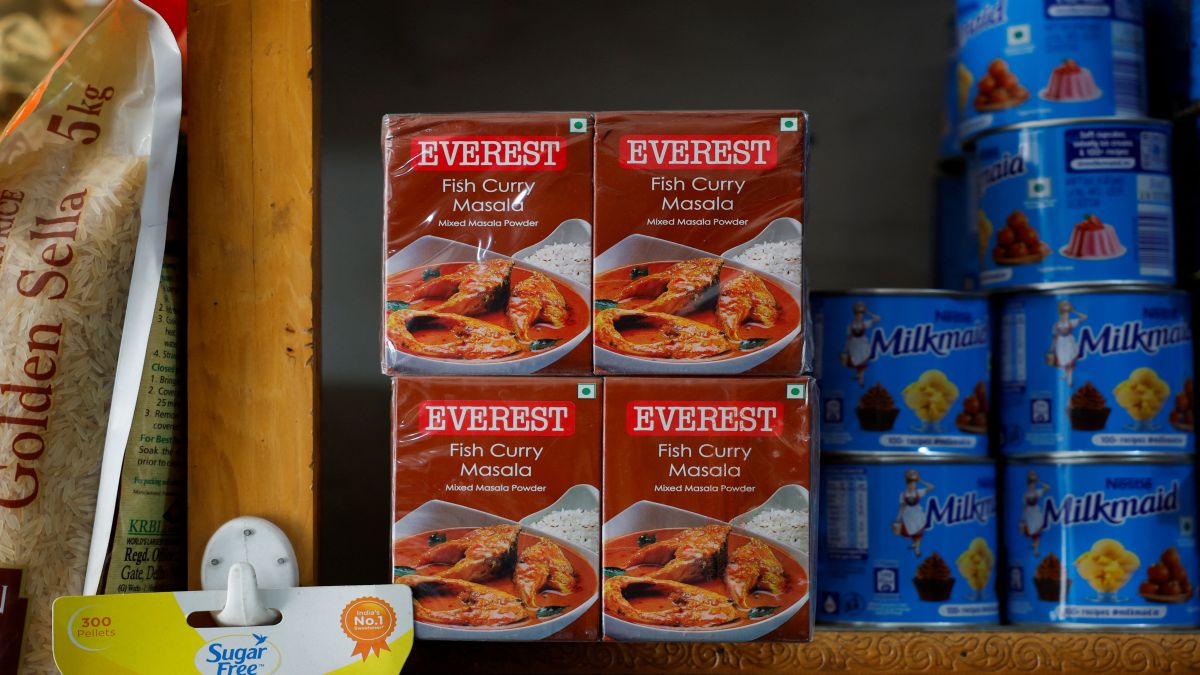MDH and Everest, Indian spice makers, have become essential ingredients in kitchens around the world, adding flavour to chicken, fish curries, and vegetable dishes. Both brands claim their products are safe, but recent regulatory actions have raised concerns.
The authorities have discovered levels of ethylene oxide that exceed permissible limits.
As a result, Hong Kong has suspended sales of certain MDH and Everest spice blends. The United States Food and Drug Administration is also investigating these allegations. The Australian Food Safety Agency has also been looking into some specific spices from these two brands.
Ethylene oxide is a known carcinogen that can damage DNA and disrupt cellular function, eventually leading to the development of various types of cancer.
Here’s what we know about MDH and Everest. What the firms say on the trouble?
MDH (Mahashian Di Hatti)
“ Mahashian Di Hatti ,” also known as MDH, is a New Delhi-based family business founded in 1919. The photo of the old man in the regal red turban on the ‘masala’ packets distinguishes the brand and contributes to its popularity, along with advertisements and packaging featuring its founder, Dharampal Gulati. Its founder, Dharampal Gulati, who is known as India’s “Spice King” due to his rags-to-riches story, has made the concept of ready-to-use spices a reality for consumers across the world.
Also Read: MDH, Everest row: What is the cancer-causing chemical found in Indian masalas?Dharampal Gulati, born in 1923 in Sialkot (now in Pakistan), dropped out of school in fifth grade to help his father, Mahashay Chunni Lal Gulati, sell spices in his small shop, before failing to sell mirrors, soaps, and try his hand at carpentry. As the business expanded locally, they became known as ‘Deggi Mirch Wale’.
Impact Shorts
More ShortsHowever, following Partition in 1947, he was forced to relocate to India, leaving everything behind. He restarted his family’s ground spice business in Karol Bagh, Delhi. As word spread about the ‘Sialkot’s Spicemakers’, MDH gained popularity and has never looked back since. Gulati, who was awarded Padma Bhushan in 2019, died in 2020.
CNBC reports that the company now sells more than 65 products and has lakhs of retailers and at least 1,000 wholesale dealers across the country. It sells ground spices as well as spice blends developed after “decades of research”.
MDH has five factories and its products are sold in India and markets such as Australia, the United States, Europe, Canada and the United Kingdom through a network of more than 400,000 retail dealers.
MDH’s revenue for 2022-2023 stood at $260 million (Rs 2,171crore).
Everest
Everest Food Products started in 1967 with three products. Its founder Vadilal Bhai Shah started his business from a small 200 square feet spice shop.
With 52 products, Everest today has global presence in around 80 countries, including in North America, Europe, the West Asia, the Asia Pacific and Africa.
Some 20 million households use Everest products every day and 3.7 billion packs of its products are sold each year, according to its website. Around 620,000 outlets sell Everest products in 1,000 small towns and cities of India.
India’s Bollywood stars Amitabh Bachchan and Shah Rukh Khan are Everest brand ambassadors, appearing together in many TV commercials to promote its products, especially those to make the famous rice dish, biryani.
Everest’s net sales for 2022-23 stood at $365 million (Rs 3,048 crore).
Trouble facing MDH and Everest
At least five countries, including Singapore, Hong Kong, and the United States, have launched an investigation into the possible contamination of spice mixes sold by MDH and Everest.
The trouble began on 5 April when Hong Kong’s Centre for Food Safety suspended the sale of three MDH spice blends (Madras curry powder, Sambhar masala, and Curry Powder Masala) as well as Everest fish curry masala. The complaints allege that the spice mixes contained high levels of ethylene oxide, a toxic chemical used as a food stabiliser.
Days later, Singapore ordered a recall of the Everest spice mix, stating that “Ethylene oxide is a pesticide that is not authorised for use in food,” adding that the pesticide renders the spices unfit for human consumption and poses a cancer risk if exposed for an extended period, as per a report in The Hindu. In response, India’s Spices Board has mandated product testing for exports and is reportedly collaborating with exporters to determine the source of contamination. The international scrutiny has prompted calls for India’s Food Safety and Standards Authority to conduct stringent quality checks on spices and curry powders sold in domestic markets, according to The Hindu.
The US Food and Drug Administration (FDA) informed Reuters that it is “aware of the reports and is gathering additional information about the situation.” The FDA has previously rejected food and spice imports from India. Similar plans have been announced by regulatory bodies in Bangladesh, Australia, and the Maldives.
Brands speak up
Both Everest and MDH have stated that they follow strict hygiene and safety guidelines.
“Only one of 60 Everest products was held for examination. We assure our customers that our products are safe and of high quality, so there is no cause for concern,” Everest said, reports TOI.
On the other hand, MDH has said the company has not received any communication from regulatory authorities of Singapore or Hong Kong and such claims are untrue, lacking any substantiating evidence.
The controversy comes at a time when the sector is experiencing strong growth. While the sector has previously faced similar issues, the timing of the action is likely to have a long-term impact on sales.
According to a TOI report, Indian spices have gathered worldwide fame, and thanks to the Indian diaspora, sales have soared over the years. According to Avendus Capital, spices are the most appealing segment in the food category, with blended spices expected to account for 35 per cent of total organised business by 2025.
With inputs from Reuters
)